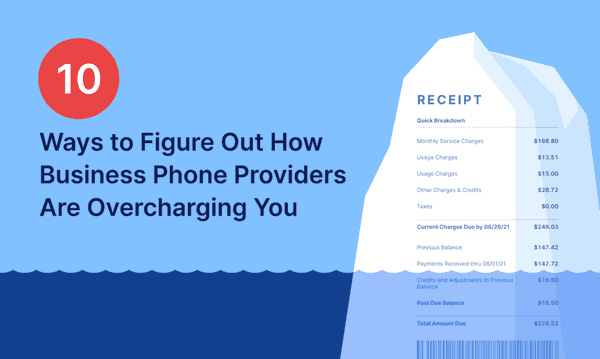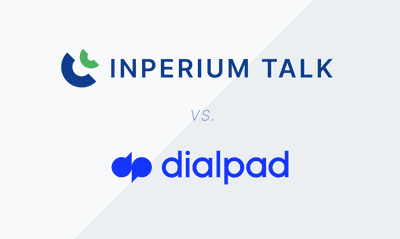Why Your Business Phone Bill Is So High? 10 Ways How Providers Are Overcharging You
Phone providers are notorious for adding hidden fees to their bills, and more often than not, businesses will pay their phone bills without even looking at them, giving phone companies an easy way to overcharge without businesses realizing. In this blog post, we will look at ways that your phone provider may be overcharging you so you can put a stop to it.
6 min read

Tatiana Ogurtsovskaia
Aug 31, 2021

Save money on your business phone plan
Running a business can be expensive, and when it comes to paying your monthly bills, a large portion of your money likely goes on your phone bill. Despite the large charges being paid month to month, most people are likely to stick with their provider and are not proactive in looking for better deals meaning they are likely to simply fall into the trap of an old, outdated plan and it can end up costing them significantly the long run.
Businesses rely heavily on phones. Not only are they the most common way a new client contacts the company, but they are also vital for customer support and sales. For this reason, phone providers tend to take advantage by adding on various charges, or in some cases, charging customers for old, outdated services. While these may not seem like a big deal month to month, in the long run, this can end up costing businesses significantly.
If you want to save money on your phone plan, then you have come to the right place. We are going to look at ten common ways that phone providers are overcharging you.
You are paying for unlimited services that are not really unlimited
A trick used by phone providers is that they offer unlimited plans that actually have a limit. Written in the terms and conditions will lie a ‘Fair Use Policy’ clause, which is designed to put a limit that the provider deems as ‘fair’ on unlimited plans. While the provider advertises the phone plan as unlimited, if the business goes over the ‘limit,’ they are subject to additional fees to pay for the additional minutes or data they have used.
Taxes and surcharges
As providers will typically leave taxes and surcharges off the initial quote, businesses often get a shock when they receive their first bill. These government charges are administrative, regulatory, sales taxes, and universal service and business license fees that are for the phone provider to pay, but they choose to pass onto the consumers to cover. In some cases, phone providers have been known to inflate the charges or completely make the fees up and disguise them as taxes. Other surcharges to be aware of our international call charges and domestic long distance, which can cost the businesses significantly if not included in your phone plan.
You are on the wrong plan
Phone providers often only tell customers when they have gone over their limit; they don’t let them know when they have gone well under and could easily downgrade. This, combined with the fact that a lot of businesses pay their phone bill without checking their usage, means that providers can get away with charging customers for the wrong plan.
You are paying for additional services you don’t need
There are sometimes additional services that you may add on, forget to discontinue. For example, if you happen to go overseas with mobile phones, you may add on international roaming. Mobile phone users can also fall victim to Cramming; this is when a provider adds a charge to your phone bill for something you didn’t order or use. These fees are often small and have a label that makes you think you did use it, such as hidden or unauthorized third-party charges; these can include device insurance, extra features, or surcharges.
You signed up to the provider with discounts that have now expired
Often customers will sign up with a provider under the guise of discounts. However, once these discounts expire, the phone bill can go up significantly and often without you being notified. In some cases, providers can be guilty of not making this clear, meaning that the customer is unaware that their discounts will expire, and their plan will go up significantly.
You are paying for features you do not need
Unlike VoIP, which includes a wide range of features at no additional cost, PBX systems often have an additional charge for features. In order to disguise what features you are paying for; these features will usually come in a bundle package. It is important to speak to your provider to find out what features are included and what can be removed in order to ensure that you are not paying for any you do not need. Features to consider are, call forwarding, extensions, customer support, voicemail, auto-attendant, and call logs.
You are still paying for old users and extensions
Traditional phone systems charge for each line and each extension that you need, and unless you advise them to do so, they will not be disconnected. This means that you will continue to pay for the phone line despite the phone line no longer being used or the user leaving the company. As the only way to know if you are paying for an additional user is by cross-checking the bill or by calling the provider, it is easy to see how old users and extensions may fall through the cracks.
You get charged a termination fee
Depending on the company, termination fees can be costly. While it is understandable that if you leave a contract early, you may need to pay a fee, phone providers have been guilty of failing to make their cancellation fees clear, meaning that businesses can be hit with a hefty termination fee that they were not expecting. There have also been cases where the fees have been deemed unfair, as the customer is moving somewhere where there’s no broadband or mobile coverage, or the service or internet speeds weren’t up to scratch.
You pay for phone insurance
Cell phone insurance is another way that phone providers often overcharge businesses. Depending on the phone or the provider, insurance can cost a couple of hundred dollars per year just in case something happens to the phone. Often businesses end up paying insurance on hardware that is outdated anyway, rather than putting the money aside a month to month in a repairs or replacement budget.
You pay upfront for your devices
Not many businesses owners factor in the cost of devices when calculating their phone service. If you are using a PBX system, as you need to pay for the upfront costs and maintenance for the telephones, PBX systems, wiring, IT staff, server room, and Internet connection, it is typically cheaper to host or lease a business phone system instead of owning depreciating assets. Whereas if you are using a business VoIP system, all you need is an Internet connection, as the app can be used on any existing device.
The best option to reduce telephone bills
An easy way to stop your phone provider from overcharging you is to do a comprehensive review of your bill each month to ensure that you are not paying for any features or services you don’t need and there are no additional charges that you do not recognize. However, the best option to reduce telephone bills is to switch to VoIP. VoIP is designed to support modern businesses by providing a cost-effective, flexible, and scalable solution alternative to traditional PBX systems.
Not only do VoIP systems come at a fraction of the price, but as it is run through the Internet, you don’t need the extensive infrastructure, and it can be used on just about any device, saving the need for hardware. Plus, being run through the Internet means that international calling is free. Along with being cheap and easy to set up, VoIP systems are feature-rich and easily integrated with other platforms, meaning you get all the staples a business need.


